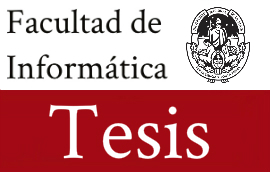A usability model for software development processes and practices
Fontdevila, Diego
- Título:
- A usability model for software development processes and practices
- Autor:
- Fontdevila, Diego
- Otros autores / Colaboradores:
- Genero, Marcela; [ Director/a] Rossi, Gustavo Héctor; [ Codirector/a]
- Temas:
- DESARROLLO DE SOFTWARE; USABILIDAD;
- URL:
- https://doi.org/10.35537/10915/121169,
- Nota de tesis:
- Tesis (Doctorado en Ciencias Informáticas) - Universidad Nacional de La Plata. Facultad de Informática, 2020.
- Extensión:
- 1 archivo (3,4 MB) : il. col.
- Resumen:
- Software processes and practices have a leading role in software development and in the last few decades a wide variety of processes and practices have emerged to face the challenges arising in the software industry. The success of adopting these processes and practices will depend on the experience and satisfaction perceived by the people who use them. Therefore, improving software development processes and practices usability might promote their adoption and make those adopted processes and practices more sustainable. Until now, research on usability has been almost exclusively focused on software products. Software process and practice usability is a novel concept that has been less explored. Thus in this Thesis the usability of software processes and practices is defined as “How easy it is to follow a process or practice, including the effort needed to learn, the probability of making mistakes, the cost of such mistakes and the overall satisfaction and motivation promoted by following the process or practice ”. And to support that definition it is necessary to provide an instrument to help software practitioners to evaluate and improve the usability of software processes and practices. Therefore the main objective of this Thesis is “Define and evaluate a usability model for software development processes and practices, with the aim of enhancing their usability, in order to improve the work experience of software developers and the overall effectiveness of process and practice improvement and adoption initiatives”. The Usability Model for Software Development Processes and Practices (UMP) has been created, refined, and evaluated, following the Design Science Research framework. The UMP will help practitioners and coaches to identify and deal with the challenges of process and practice adoption, process improvement specialists to better plan improvement initiatives, methodologists to better design new ways of working, teachers and mentors to improve how they facilitate learning, and researchers working on processes or practices. Adoption initiatives might increase their probability of success by adapting processes and practices to make them more usable, or at least by refining adoption strategies to take usability challenges into account. It will also help make processes and practices sustainable so that they are not easily abandoned. To evaluate the UMP several empirical studies were conducted: an initial expert evaluation to assess its feasibility; a focus group for gathering feedback on the UMP characteristics and metrics; two reliability studies, an inter-rater agreement study on Scrum and an inter-rater reliability study on TDD-BDD; and two studies to evaluate UMP utility, a case study on the application of the UMP to the VMP method, and a field quasi-experiment in which an industry development team applied the UMP to improving their BDD practice. The results of the utility studies show that users consider the UMP useful, and 37 independent evaluations have been effectively conducted on real life processes and practices. This Thesis contributions include: the UMP itself with its characteristics and metrics, the UMP evaluation process, the knowledge created about the reliability and utility of the UMP through the empirical studies, and the usability profiles characterizing currently mainstream processes and practices like Scrum, Continuous Integration, TDD and BDD, obtained through the application of the UMP.
Puede solicitar más fácilmente el ejemplar con: TES 20/75
Ver índiceLa edición contiene los siguientes documentos electrónicos para descargar:
En este momento no hay ningún ejemplar disponible.
Disponibilidad Actual Para Préstamo: 0 Disponibilidad Actual Para Sala de Lectura: 0 Cantidad Actual de Reservas: 0 Cantidad Actual de Préstamos: 0
